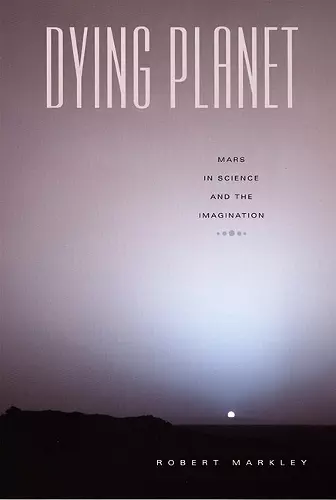Dying Planet
Mars in Science and the Imagination
Format:Hardback
Publisher:Duke University Press
Published:8th Sep '05
Currently unavailable, and unfortunately no date known when it will be back

Analyzes scientific, literary, and popular works of the last century to offer a cross-disciplinary reading of Mars as both an object of scientific study and as a site on which humankind has projected its fears of ecological devastation
For more than a century, Mars has been at the center of debates about humanity’s place in the cosmos. Focusing on perceptions of the red planet in scientific works and science fiction, Dying Planet analyzes the ways Mars has served as a screen onto which humankind has projected both its hopes for the future and its fears of ecological devastation on Earth. Robert Markley draws on planetary astronomy, the history and cultural study of science, science fiction, literary and cultural criticism, ecology, and astrobiology to offer a cross-disciplinary investigation of the cultural and scientific dynamics that have kept Mars on front pages since the 1800s.
Markley interweaves chapters on science and science fiction, enabling him to illuminate each arena and to explore the ways their concerns overlap and influence one another. He tracks all the major scientific developments, from observations through primitive telescopes in the seventeenth century to data returned by the rovers that landed on Mars in 2004. Markley describes how major science fiction writers—H. G. Wells, Kim Stanley Robinson, Philip K. Dick, Edgar Rice Burroughs, Ray Bradbury, Robert Heinlein, and Judith Merril—responded to new theories and new controversies. He also considers representations of Mars in film, on the radio, and in the popular press. In its comprehensive study of both science and science fiction, Dying Planet reveals how changing conceptions of Mars have had crucial consequences for understanding ecology on Earth.
“Dying Planet is a work of meticulous scholarship documenting the scientific controversies and literary representations of Mars from the early Renaissance to the present. Its comprehensiveness will make it a valuable resource for literary scholars, cultural critics, and scientists interested in the cultural history of this fascinating world.”—N. Katherine Hayles, author of My Mother Was a Computer: Digital Subjects and Literary Texts
“This is both a complete literary history and an exemplary exercise in modern science studies, tracing how a particular science works over the generations to incorporate new technologies, create paradigm shifts, and understand the universe a little more accurately. By combining these in one study, Robert Markley clarifies a great deal about the poorly understood but very important relationships between science, literature, culture, and reality. He also gives us all the latest news from Mars, which keeps getting more interesting. It’s a fascinating story, and Markley is the first to tell it.”—Kim Stanley Robinson, author of Red Mars, Green Mars, and Blue Mars
“Dying Planet is an excellent and detailed book. For anyone seeking to understand the fascinating intertwined histories of science and science fiction, and how a ball of rock, just six thousand seven hundred kilometres in diameter and several tens of millions of kilometres away, has exerted such an astonishing influence on our imaginations, it will be well worth reading.” -- Charles S. Cockell * Interdisciplinary Science Reviews *
“Dying Planet is an impressive study of Mars in the cultural imagination, especially in science and science fiction. . . . Thoroughly captivating and meticulously researched, Dying Planet supplies readers with a generous bibliography of science fiction writing about Mars.” -- Kent A. Ono * American Literature *
"[A] wonderfully nuanced reading of the red planet's cultural history. . . . [T]his is a masterly exploration of the 'interplanetary sublime.'" -- P.D. Smith * The Guardian *
"Markley writes about Mars as a knowledgeable outsider, weaving in cultural history and science fiction. . . . [T]here are many historical, literary, political, and cultural nuggets. . . ." -- David Grinspoon * Scientific American *
ISBN: 9780822336006
Dimensions: unknown
Weight: 785g
456 pages